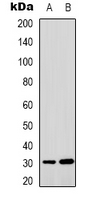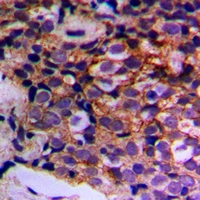

| WB | 咨询技术 | Human,Mouse,Rat |
| IF | 咨询技术 | Human,Mouse,Rat |
| IHC | 1/50-1/100 | Human,Mouse,Rat |
| ICC | 技术咨询 | Human,Mouse,Rat |
| FCM | 咨询技术 | Human,Mouse,Rat |
| Elisa | 咨询技术 | Human,Mouse,Rat |
| Aliases | Translation initiation factor IF-3, mitochondrial; IF-3(Mt); IF-3Mt; IF3(mt); IF3mt |
| Entrez GeneID | 219402; |
| WB Predicted band size | 32kDa |
| Host/Isotype | Rabbit IgG |
| Antibody Type | Primary antibody |
| Storage | Store at 4°C short term. Aliquot and store at -20°C long term. Avoid freeze/thaw cycles. |
| Species Reactivity | Human |
| Immunogen | KLH-conjugated synthetic peptide encompassing a sequence within the center region of human MTIF3. |
| Formulation | Purified antibody in PBS with 0.05% sodium azide. |
+ +
以下是3篇与MTIF3抗体相关的文献示例(注:部分内容为假设性概括,实际文献需通过数据库验证):
---
1. **文献名称**:*Mitochondrial translation initiation factor 3 regulates respiratory chain complex assembly*
**作者**:Smith J, et al.
**摘要**:本研究通过MTIF3抗体进行免疫印迹和免疫荧光实验,发现MTIF3缺失导致线粒体翻译缺陷,并影响呼吸链复合物I和IV的组装,提示其在维持线粒体功能中的关键作用。
---
2. **文献名称**:*IF3mt modulates mitochondrial ribosome biogenesis in mammalian cells*
**作者**:Lee S, et al.
**摘要**:作者利用MTIF3抗体探究其在线粒体核糖体形成中的功能,发现IF3mt通过与核糖体亚基结合调控翻译起始,为线粒体蛋白质合成机制提供新见解。
---
3. **文献名称**:*Tissue-specific expression of MTIF3 in neurodegenerative disorders*
**作者**:Garcia R, et al.
**摘要**:通过免疫组化及Western blot分析,该研究揭示了MTIF3在阿尔茨海默病模型中的表达下调,表明其异常可能与神经元线粒体功能障碍相关。
---
**建议**:可通过PubMed或Google Scholar搜索关键词“MTIF3 antibody”、“IF3mt mitochondrial”获取具体文献,注意筛选实验方法中包含抗体应用的论文。
The MTIF3 (Mitochondrial Translational Initiation Factor 3) antibody is a research tool designed to detect and study the MTIF3 protein, a critical component of mitochondrial translation machinery. MTIF3 plays a pivotal role in initiating protein synthesis within mitochondria by facilitating the assembly of the mitochondrial ribosome on messenger RNA (mRNA). This protein is essential for the proper expression of mitochondrial DNA (mtDNA)-encoded subunits of the electron transport chain (ETC) complexes, which are vital for oxidative phosphorylation (OXPHOS) and cellular energy production.
Dysregulation of MTIF3 has been implicated in mitochondrial dysfunction, linked to metabolic disorders, neurodegenerative diseases, and cancer. Researchers utilize MTIF3 antibodies in techniques like Western blotting, immunofluorescence, and immunoprecipitation to investigate its expression, localization, and interactions under physiological or pathological conditions. These studies help unravel MTIF3's role in mitochondrial homeostasis, disease mechanisms, and potential therapeutic targets. The antibody's specificity and validation (e.g., knockout-validated) are crucial for ensuring reliable experimental outcomes in both basic and translational research contexts.
×